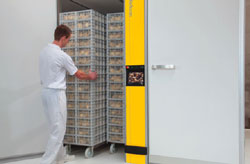



Optimum Timing for Pulling Day–Old Chicks
Incubation time depends on flock age, egg storage time and incubation temperature, according to Marleen Boerjan of Pas Reform, so it is impossible to standardise optimal pulling time.
The length of the incubation period is influenced by several factors. In general terms, the time needed to complete development from a day one embryo to a day–old hatchling depends on the species. The chick embryo hatches after 21 days of incubation, while turkey and duck poults hatch after 28 days. However, within each species, the duration of incubation and thus the pulling time varies between different batches of eggs.
Flock age is an inherent factor in determining hatching time. Embryos from flocks younger than 30 weeks may need an additional five to seven hours to complete development, compared to older flocks. Incubation time increases again when flocks are older than 60 weeks.
Storage of the eggs also has a major impact on the length of the incubation period, probably because the albumen and yolk undergo physical changes during storage: prolonged periods of storage are known to be damaging to the early embryo. When eggs have been stored for periods exceeding three days, one hour extra incubation time should be applied for every additional day of storage over three days.
Incubation temperature is proven to be the most important external factor for determining the rate of embryonic development and growth. In turkeys, the hatching time increases by six to eight hours, depending on breed and flock age, when the incubator temperature is decreased by 0.5°C. For chickens, the incubation period increases by four hours per 0.5°C decrease in temperature set point. However it is also important to note that when the incubator temperature is too high, in excess of 39°C (102.2°F) after day 16, the incubation period also increases.
With all the above taken into consideration, it is clearly impossible to standardise optimal pulling time. However, it is clear that if chicks are pulled too early, too many chicks will be classified as second class because they are not completely dry. When chicks are left too long in the hatcher, the risk of dehydration increases – and with it, the risk of mortality in the first week. Furthermore, dehydrated chicks should be avoided at all times, because this has clearly been shown to adversely affect chick performance at farm level.
Advice
- Do not pull chicks ‘on the clock’
- Crush some empty shells to judge the correct timing for pulling chicks. When the membranes crumble in your fist without falling apart into small pieces, the chicks were pulled at the right time
- Use your observations during the pulling of chicks to fine–tune setting time for future batches.
April 2012








